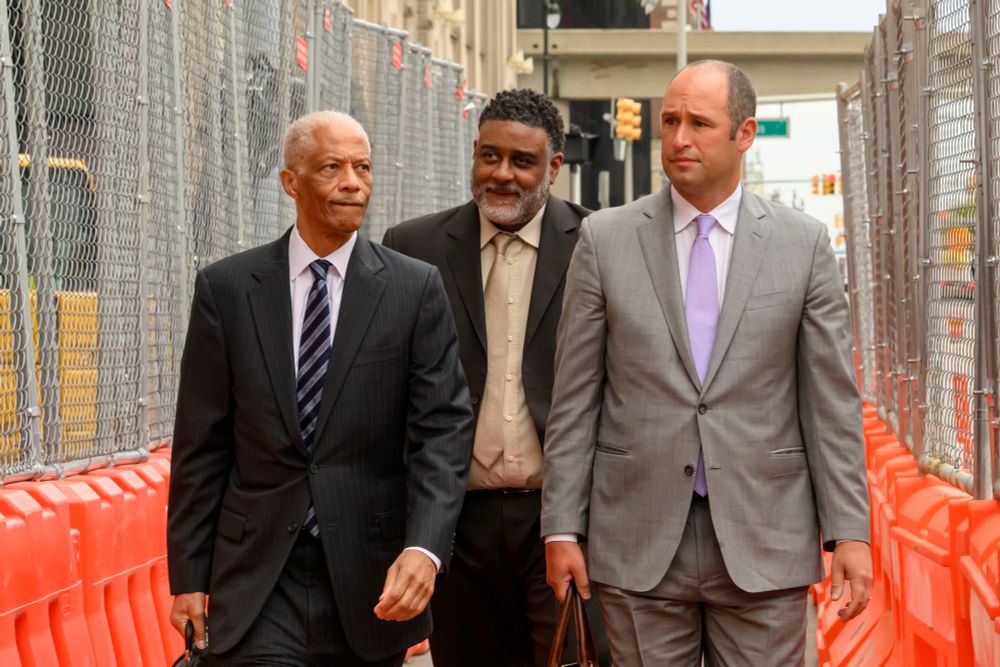Ex-Detroit Riverfront CFO William Smith loses major asset as feds liquidate holdings
A successful Southfield nightclub owned by former Detroit Riverfront Conservancy Chief Financial Officer William Smith is being sold and a federal judge Wednesday approved putting the money in an account so it can be given eventually to the conservancy, a nonprofit victimized in one of the largest criminal schemes in Detroit history.
The sale of Duo Restaurant and Lounge's assets for $155,000 includes liquor licenses, booze and furniture, fixtures, and equipment not owned by the landlord at a nightclub that was one of the most prolific liquor-selling locations in Michigan. That is, until Smith was arrested last year and accused of stealing at least $44.3 million from the conservancy during a prolonged scam that robbed the nonprofit of money that was supposed to revitalize Detroit's industrial riverfront.
U.S. District Judge Susan DeClercq approved putting in escrow money from the sale to an undisclosed buyer until the end of the criminal case. Proceeds, minus taxes and assessments owed by Smith's company, YBE Food Group, will be deposited with the U.S. Marshals Service and are expected to be given to the conservancy.
The court filing reflects how the conservancy is likely to receive pennies on the dollar as prosecutors continue to liquidate assets seized or frozen during the investigation. The value of the assets — including rental homes, a condominium in Mexico, a $1.5 million mansion in Novi, a Southfield nightclub, a 36-foot yacht named the "SS Duo," and two motorcycles — falls far short of the amount embezzled from the nonprofit, Assistant U.S. Attorney K. Craig Welkener wrote in an earlier court filing.
More: Feds reveal luxury items seized from ex-Detroit Riverfront Conservancy CFO William Smith
“Since the vast majority of the real property is saddled with high-dollar mortgages, the government may do well to recoup $2-3 million in equity value from all of the seized assets, in total, even after defeating any claims by third parties and selling the assets on the market,” the prosecutor wrote.
Prosecutors recommended the judge approve the sale.
There was no immediate comment from a conservancy spokesman.
The nightclub was in a plaza along Northwestern Highway, near Inkster Road, tucked between a comedy club and Woof Woof, a doggie boutique.
Despite its small footprint, state records show Duo sold more liquor ($868,051) than almost every other bar, restaurant or concert venue in Michigan in 2023, except Little Caesars Arena ($1,186,551) and the Detroit sports bar Brass Rail ($880,894), according to Michigan Liquor Control Commission sales data.
The flow of liquor, however, has stopped and Duo has been shuttered amid the scandal emerged one year ago. The Michigan Liquor Control Commission suspended the nightclub's liquor license, a move triggered when a venue "fails to keep liquor liability insurance active," commission spokeswoman Abby Rubley told The Detroit News.
The nightclub is the latest asset unloaded since Smith pleaded guilty late last year.
Last month, DeClercq approved the sale of a nearly $700,000 townhouse in Georgia purchased by Smith. And a court filing in October indicated Smith had a deal to sell a party store in Idlewild — Michigan's "Black Eden" — for $77,827.
The conservancy, with $205 million in assets, has played a key role in Detroit since the city emerged from the largest municipal bankruptcy in U.S. history a decade ago, helping to provide greater access to Detroit's international riverfront and working to redevelop a more than five-mile stretch from the Ambassador Bridge almost to Belle Isle.
Smith is scheduled to be sentenced April 24 and faces up to 20 years in federal prison. He pleaded guilty in November to one count each of wire fraud and money laundering six months after conservancy officials placed him on leave and disclosed an investigation into financial mismanagement that was being handled by the Michigan State Police and, later, the FBI.
The eventual criminal case exposed lax oversight by regional power brokers at a nonprofit overseen by some of the area's most powerful business leaders and bankrolled by southeast Michigan's leading philanthropies. Officials recently dropped plans to build a temporary RiverWalk path that would have linked the eastern and western parts of the trail due to “challenges associated with the fraud disclosed earlier this year."
Since November 2012, Smith routinely used the conservancy’s money to pay off American Express charges that he and several relatives incurred buying furniture, clothing, designer handbags, lawn care, airline tickets and entertainment, prosecutors said.
That totaled $15.6 million in American Express charges. Smith used approximately $14.9 million in conservancy money to pay for those charges, according to the court filing.
Smith also was accused of wiring $24.4 million from a conservancy account to one of his companies, the Joseph Group & Associates.
Other allegations contended that Smith tried to cover up the fraud by taking out a $5 million line of credit with Citizens Bank on behalf of the conservancy, falsifying the signature of the conservancy's board secretary and depositing the money into the nonprofit’s accounts.
rsnell@detroitnews.com
This article originally appeared on The Detroit News: Ex-Detroit Riverfront CFO William Smith loses major asset as feds liquidate holdings




























